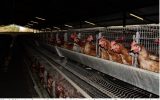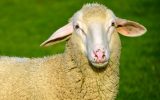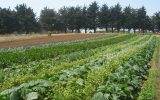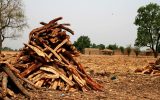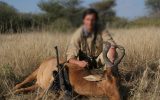At this point, it is undeniably clear that the Covid-19 pandemic has affected us all. All professions have been hard hit in one way or the other. Although the agricultural sector offers some certainty, as food will remain essential and in demand, still majority of farmers have been negatively affected by the pandemic.
Namfarmers team had a depth inquiry with the chairperson of Okakarara farmers association: Mr Jackson Uaapi Kazetjikuria, of how they are keeping on amidst this time of Covid-19. The Okakarara farmers association is a rural-based registered non-profit organisation established to foster organised agriculture and secure better sustainable living standards for its members. The association intends on promoting diversified farming systems that create resilient rural communities to climate change. OKAFA has currently over 300 registered members and it`s an affiliate member of the Otjozondjupa Communal Farmers Union (OCFU) and subsequently to the Namibia National Farmers Union (NNFU). The biggest decision making organ of the association is the Annual General Meeting (AGM) which elects the executive committee that manage the affairs of the association on a day-to-day basis on behalf of the members. Membership is voluntarily, thus any farmer who is 18 years and older can become a member. The OKAFA is on a mission to lay a good foundation for sustainable and organised agriculture. Their vision is to transform communal farming to a state of organised commercialised agriculture that foster sustainable livelihoods and creates resilience to climatic conditions.
According to Jackson Uaapi, the pandemic have negatively affected farmers as majority of them have lost their income that used to be derived from a variety of farming activities that have come to a halt. Incomes that farmers used to get from selling milk and milk products like Omaze-gezengombe (butter fat or milk fat) have been highly disturbed as a result of the pandemic. The fat content, particularly of cow`s milk is modified to make a variety of products. Based on Covid-19 regulation and adherence by the head of state; farming have been classified as an essential service hence some farming activities such as auctions can still take place as long as they adhere to the rules established. The worst scenario is that small businesses that operates during auctions are not allowed to trade due to Covid-19. Jackson Uaapi also highlighted that some part-time farmers are stacked between a rock and a hard place. Part time farmers normally resides in towns where they are employed and during weekends, they then drive off to their farms to observe and carry on with their farming activities. However with regions such as Erongo and towns such as Windhoek and Okahandja that are on a strict lockdown, this have made it very difficult for part-time farmers to carry out their operation.
Jackson further adds that farmers in the communal areas haven`t yet recovered from the 2019 drought. The 2019 drought have led to members of the OKAFA losing a quarter to half of their cattle and some farmers have completely lost all. Although the rain was plentiful this year and grass abundant, unfortunately it haven`t rained cattle, goats and sheep hence the livestock population is still recovering. Jackson also stated that the drought incentive program ended way too early. According to him, it could have been good if the program could have carried on for quite some time while the farmers are still recovering. Jackson also requested, for farmers to be met halfway with some program of restocking, for instance whereby farmers can be subsidised by each head of cattle that they will be buying. He further believe that this would be far better compared to the loans that the governments have introduced for recovery through the Agribank. According to him more communal farmers are not qualifying for the loans due to the strict requirements set by the bank and the criteria’s that are not communal farmers friendly.
Compared to 2019, the weaners’ price have drastically increased however the calves that farmers are currently having are few in number. Therefore according to Jackson, most farmers that have lost a great number of their herds last year, are not benefitting much from this high prices. Uaapi said that amidst this hard times of trying and testing, the Okakarara farmers association have on different occasions assisted residents of Okakarara with donation of food during lock down time.
The OKAFA leadership have expressed their gratitude to the newly appointed governor of Otjozondjupa region for his approach towards farming in the region. In the same vein, they also thanked the outgoing councillor of Okakarara Vetaruhe Kandorozu for the support that he has been rendering to farmers during his time in office. The OKAFA leadership is also grateful to Mr Vetumbuavi Junius Mungunda for his patronage and ongoing support to the association. Vetumbuavi have committed to offer a Stud Bonsmara bull to the annual award of the best farmer under OKAFA. This started as from 2019 and his support is expected to go until the year 2023. The Stud Bonsmara is rolled from his farm, Okozonduno – Bonsmara.




